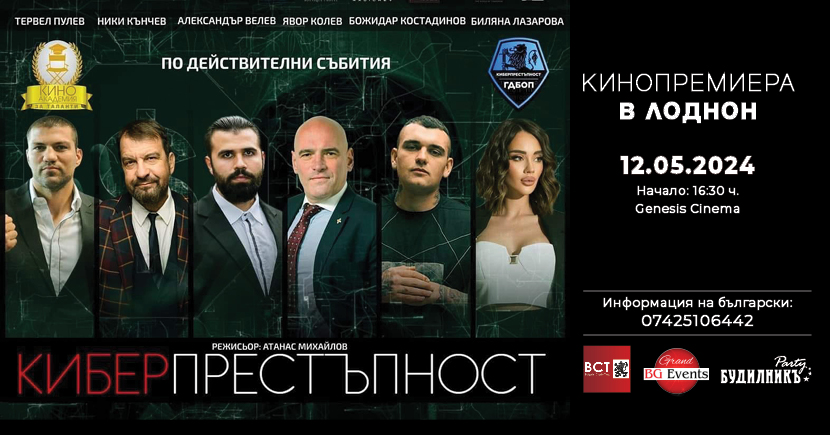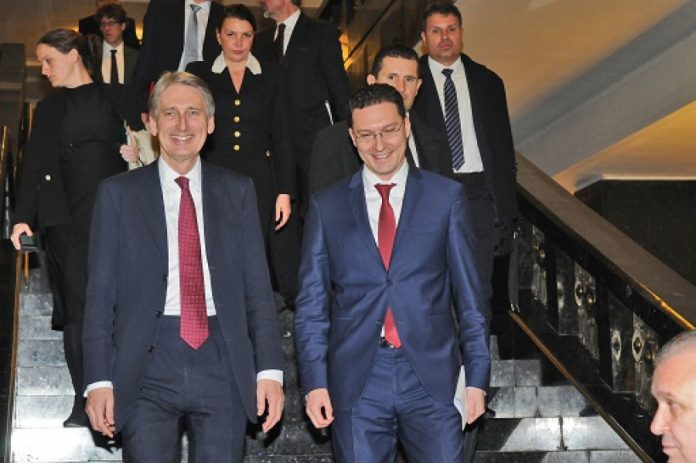By Rumyana Vakarelska
The British Foreign Secretary Philip Hammond MP has paid an official visit to Bulgaria on 14 January 2015 on invitation of the Bulgarian Minister for Foreign Affairs, Daniel Mitov. Hammond will also meet Prime Minister Boyko Borissov and President Rossen Plevneliev, discussing co-ordinated counter-terrorism actions, energy security, bi-lateral trade and EU reform.
Philip Hammond has been until the summer of 2014 UK’s Defence Secretary and is one of the key members of David Cameron’s Cabinet. Meanwhile, Daniel Mitov had in recent weeks a number of meetings with international diplomats sustaining Bulgaria’s position in EU and internationally as an important international partner in combating terrorism.
US Secretary of State John Kerry will pay his first visit to Bulgaria on 15 January, just a day after Mr Hammond’s visit, drawing attention to Bulgaria’s importance in securing EU’s border and how can help Bulgaria move on with the challenging tasks ahead within EU and also with Bulgaria’s future closer relations with Turkey as part of South East Europe’s national and economic security, and especially in relation to energy diversification.
Mr Hammond was particularly interested in the influx and the situation of the Syrian refugees in Bulgaria, whose number has been increasing in the knowledge that the Dublin agreement under which EU countries act on receiving refugees requires that the first EU country they enter has to accept them on their territory. While this agreement is viewed by political experts as outdated in relation to the Syrian crisis, it has not been officially changed. Meanwhile, Syrian refugees coming to Bulgaria have moved on to other EU countries such as Germany and Sweden, while the UK’ government has been under public pressure to receive a bigger number, not only people under special circumstances.
Meanwhile, following Hammond’s visit, the Bulgarian PM is already trying to find ways to complete 82 km of the existing border wall with Turkey, as it is viewed as a way to reduce seven times the influx of refugees from the Middle East to EU, who pass through Bulgaria’s Southern neighbour.
Mitov and Hammond said in a joint statement that ‘Bulgaria and the UK will continue to work together and with all Allies to implement the Wales NATO Summit commitments, in particular the Readiness Action Plan, in order for the Alliance to be fully prepared and ready to tackle 21st century security threats.
According to the statement, they have also discussed the situation in Ukraine, the challenges and opportunities facing South-Eastern Europe, developments in the Middle East and North Africa and confirmed their intentions for an enhanced co-operation in the context of the situation in the wider Black Sea region.
‘We underlined our commitment to the stability and independence of Ukraine’, they said.
‘The EU should continue to support the reforms in the countries of the Eastern Partnership and the implementation of the Association Agreements/Deep and Comprehensive Free Trade Areas with Ukraine, Moldova and Georgia’.
The two ministers have also given a ‘green light’ to a new Bulgarian-British Business Association, but security matters seem to have prevailed most of the talks, thus giving Bulgaria higher responsibilities and acknowledgement in EU and NATO alike.
In addition, on the day of Hammond’s visit to Bulgaria, Al Qaida’s branch in Yemen has taken responsibility for the three separate terrorist attacks in Paris last week, leaving 17 people dead.
Hammond’s trip to Bulgaria has built upon the visits of the Minister for Europe, David Lidington MP, in 2013 and UK Royal visits of 2013 when Prince Charles visited Bulgaria and of 2014 when the Bulgarian President Rossen Plevneliev paid a visit to HM the Queen Elizabeth II. Hammond is also the first British Foreign Secretary to go to an official visit to Bulgaria since 1998.
On the same day and in the context of some of the conversations at a high level, Irina Bokova, the Secretary General of UNESCO, has commemorated the French journalists, who were killed a week ago in a special event in Paris, which was attended by over 300 French and international members of the media. This coincided with the publication of the next issue of Charlie Hebdo magazine, which was published in a circulation of 5 million issues to reach a much bigger readership in France and internationally and will be translated in English and Spanish. The magazine has completely sold out on its first day of publication. It has also been published in Turkey, the only Muslim country to do that, printing it in Turkish.
Most importantly, Bokova suggests UNESCO’s special plan for the defence of journalists’ security all over the world. This might be a very important step in defending the right of freedom of speech, but also protecting journalists’ human rights and lives.
Last Sunday, the British PM David Cameron joined the French President Francois Holland in a protest against Paris atrocities together with Angela Merkel and other EU’s and world leaders, while Daniel Mitov has expressed his condolences to his French counterpart Lorain Fabiu. Mitov has also met Irina Bokova, who was recently visiting Bulgaria.
In the week of the Paris attacks, Daniel Mitov has also met the Algerian ambassador to Bulgaria, Ahmed Butash in view of the forthcoming visits of the Algerian foreign minister to Bulgaria, Ramtan Lamamra. Mitov has also confirmed his invitation to Abdelazis Bouteflika, the Algerian President. These meetings are particularly important for the relations between the two countries, especially in relation to joint counter terrorism efforts, as Bulgarian diplomats similarly to their international counterparts are trying to involve North African countries’ governments to support anti-terrorism actions. Jill de Kerkov, the EU’s counter-terrorism co-ordinator has also met Mitov last week, reminding that Bulgaria needs to align its counter-terrorism legislation to UN’s 2178/2014/ resolution regarding criminalisation of international terrorists.
UK’s Foreign Secretary has also discussed cooperation with Bulgaria within the EU and the issues of EU Reform, including better regulation, increased competitiveness and free trade, as well as deepening the markets of goods and services purchased online, says the statement in the context of Hammond’s visit to Bulgaria.
However, EU’s reform agenda has also been widely used by David Cameron’s government for distancing the country from EU, including freedom of movement. However, this subject outside the areas of business and trade has to be taken with a pinch of salt, especially when EU has already been undergoing a substantial legislative and organisational reform since the new members of the EC and the EP have been appointed last year. EU reform was also been the key subject of David Cameron’s conversations with the German Chancellor Angela Merkel last week in London and although overshadowed by Paris terrorist attacks, has resulted in a few newly agreed points, including ways to limit benefit tourism.
Copyright2015@Rumyana Vakarelska
May sponsors and advertisers for original English language articles and advertorials contact the author Rumy Vakarelska, Partner Team New Europe, by writing to rumy.vakarelska@gmail.com





















